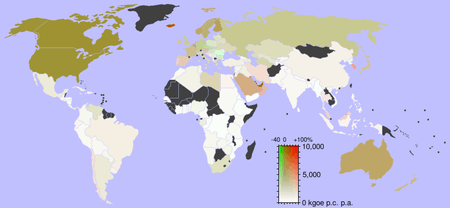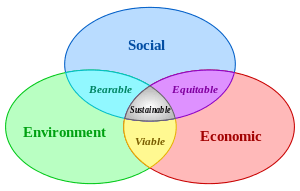Overconsumption


Overconsumption is a situation where resource use has outpaced the sustainable capacity of the ecosystem. A prolonged pattern of overconsumption leads to environmental degradation and the eventual loss of resource bases. Generally the discussion of overconsumption parallels that of human overpopulation; that is the more people, the more consumption of raw materials to sustain their lives. Currently, the inhabitants of the developed nations of the world consume resources at a rate almost 32 times greater than those of the developing world, who make up the majority of the human population (7.4 billion people).[1]
The theory of overpopulation reflects issues of carrying capacity without taking into account per capita consumption, by which developing nations are evaluated to consume more than their land can support. Green parties and the ecology movement often argue that consumption per person, or ecological footprint, is typically lower in poor than in rich nations.
Effects
A fundamental effect of overconsumption is a reduction in the planet's carrying capacity. Excessive unsustainable consumption will exceed the long term carrying capacity of its environment (ecological overshoot) and subsequent resource depletion, environmental degradation and reduced ecological health.
The scale of modern life's overconsumption has enabled an overclass to exist, displaying affluenza and obesity . However once again both of these claims are controversial with the latter being correlated to other factors more so than over-consumption.
In the long term these effects can lead to increased conflict over dwindling resources [2] and in the worst case a Malthusian catastrophe. Lester Brown of the Earth Policy Institute, has said: "It would take 1.5 Earths to sustain our present level of consumption. Environmentally, the world is in an overshoot mode."[3]
Economic growth
The Worldwatch Institute said China and India, with their booming economies, along with the United States, are the three planetary forces that are shaping the global biosphere.[4] The State of the World 2005 report said the two countries' high economic growth exposed the reality of severe pollution. The report states that
The world's ecological capacity is simply insufficient to satisfy the ambitions of China, India, Japan, Europe and the United States as well as the aspirations of the rest of the world in a sustainable way.
Footprint
—Paul R. Ehrlich, biologist[5]
The idea of overconsumption is also strongly tied to the idea of an ecological footprint. The term “ecological footprint” refers to the “resource accounting framework for measuring human demand on the biosphere.” Currently, China is roughly 11 times lower in per capita footprint, yet has a population that is more than four times the size of the USA. It is estimated that if China developed to the level of the United States that world consumption rates would roughly double.[1] According to Scientific American, one person from China uses 53 times fewer resources than the average American.[6]
Counteractions
The most obvious solution to the issue of overconsumption is to simply slow the rate at which materials are becoming depleted. Less consumption naturally has negative effects on economies - so instead, countries must look to curb consumption rates while allowing for new industries, such as renewable energy and recycling technologies, to flourish and deflect some of the economic burden. A fundamental shift in the global economy may be necessary in order to account for the current change that is taking place or that will need to take place. Movements and lifestyle choices related to stopping overconsumption include: anti-consumerism, freeganism, green economics, ecological economics, degrowth, frugality, downshifting, simple living, minimalism, and thrifting.
Recent grassroots movements have been coming up with creative ways to decrease the amount of goods we consume. The Freecycle Network is a network of people in one's community that are willing to trade goods for other goods or services. It is a new take on thrifting while still being beneficial to both parties.[7]
Other researchers and movements such as the Zeitgeist Movement suggest a new socioeconomic model which, through a structural increase of efficiency, collaboration and locality in production as well as effective sharing, increased modularity, sustainability and optimal design of products, is expected to reduce resource-consumption.[8]
See also
- Artificial demand
- Collaborative consumption
- Conspicuous consumption
- Consumption (economics)
- Degrowth
- Environmental studies
- Externality
- Mottainai
- Overexploitation
- Overshoot (population)
- Peak copper
- Peak oil
- Preorder economy
- Santosha (renunciation of the need to acquire)
- Steady-state economy
- Surplus: Terrorized into Being Consumers (film)
References
- 1 2 Diamond, Jared: (2008-01-02). "What's Your Consumption Factor?" The New York Times
- ↑ Effects of Over-Consumption and Increasing Populations. 26 September 2001. Retrieved on 19 June 2007
- ↑ Brown, Lester R. (2011). World on the Edge: How to Prevent Environmental and Economic Collapse. Earth Policy Institute. Norton. p. 7. ISBN 113654075X.
- ↑ Renner, Michael (January 2006). "Chapter 1: China, India, and the New World Order". State of the world 2005: A Worldwatch Institute Report on progress toward a sustainable society. New York: W.W. Norton. ISBN 0-393-32666-7. OCLC 57470324. Retrieved 2009-09-14.
- ↑ Biologists say half of all species could be extinct by end of century. The Guardian. February 25, 2017.
- ↑ "American Consumption".
- ↑ "The Freecycle Network". www.freecycle.org. Retrieved 2017-05-18.
- ↑ The Zeitgeist Movement - Frequently Asked Questions Retrieved on 6 May 2014
External links
- Fifty Possible Ways to Challenge Over-Commercialism by Albert J. Fritsch, SJ, PhD
- Why people hate fat Americans by Daniel Ben-Ami
- Optimum Population Trust
- UN Division for Sustainable Development, Agenda 21, Chapter 4 – "Changing Consumption Patterns"
- Footprint For Nations
- The Story of Stuff (video)
- Energy statistics-Oil Consumption by Country
- World Energy Use Graph
- Global GDP by Country

